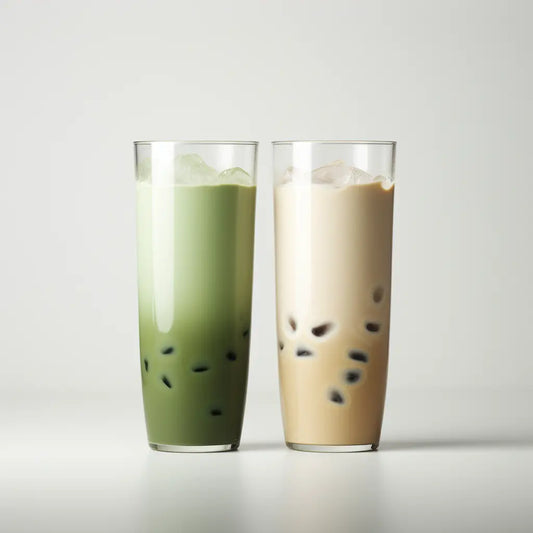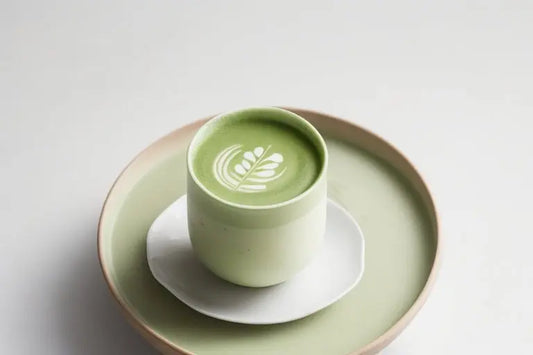Table of Contents
- The Matcha Mania: A Quick Introduction
- The Traditions of Matcha
- The Matcha Distinction: What Sets it Apart?
- The Sensational Matcha Effects on Health
- Matcha, Health, and Scientific Backing
- Drinking Your Way to Wellness: Preparing Your Matcha
- Concocting a Matcha Lifestyle
- Additional Tips and Ideas for Matcha Lovers
- Conclusion
The Matcha Mania: A Quick Introduction
Oh, matcha! You've likely heard the name echoing in the aisles of your local grocery store or seen it displayed proudly on beverage menus at coffee shops. The vivid green-colored tea from the East has taken the world by storm, boasting a full-bodied flavor profile and a plethora of potential health benefits. But what makes matcha so fascinating? Simply put, its uniqueness! It's not just another type of tea; it's a celebration of culture, health, and pure culinary delight.
Continuing our quest into the heart of this green wonder, let's first travel back in time to its traditional roots.
The Traditions of Matcha
The story of matcha begins in the tranquil monasteries of Japan, where monks have been consuming this emerald nectar for hundreds of years. Nestled quietly in their spiritual cocoon, they’ve used matcha not just as a beverage, but as a sacrament to aid in meditation and inner peace.
Diving deeper, the original preparation of matcha involves a meticulous process. It requires shading the tea plants for a few weeks before harvest, handpicking the best leaves, and then grinding them slowly on stone mills. Could this be why each cup of matcha seems to carry a whisper of serenity? Perhaps, moving on.
The Matcha Distinction: What Sets it Apart?
Now let's unravel another mystery: what makes matcha so different from other teas? No, it's not the vibrant green color or the luscious, creamy texture. It's how it's consumed! Most tea we drink involves steeping leaves; however, with matcha, you consume the whole leaf! This difference makes for a stronger, richer taste, coupled with an impressive list of health effects. Intriguing, right? The world of matcha is full of such nuggets of wonder.
The Sensational Matcha Effects on Health
Many reach out for a cup of matcha not just for its robust flavor but also for its fantastic health benefits that even science nods at. From hiking up your metabolism, battling bacteria, calming your mind, boosting your immunity to even potentially countering the risk of cancer – the list seems so implausible for a humble cup of tea! But don’t take our word for it. Let’s dig into some research, shall we?
Matcha, Health, and Scientific Backing
Stepping into the world of science may seem like an alien voyage, but trust me, it is rather enlightening. Studies have shown that matcha houses a wealth of antioxidants, dietary fiber, chlorophyll and some essential vitamins. Most notably, a catechin called 'EGCG,' known for its cancer-fighting properties, is found in abundance in matcha.
Was that too much of a scientific jargon? Let's interpret it into regular English. Simply put, drinking matcha might protect your body from free radicals, cut down your cholesterol levels, aid your digestion, detoxify your body and potentially protect against cancer. Sounds splendid, doesn't it?
Drinking Your Way to Wellness: Preparing Your Matcha
Now that we've got enough ammunition to be matcha cheerleaders, how about we whip up some? All you need is matcha powder, a whisk, a bowl, and hot water. It can be a ceremony or a daily ritual, depending on your vibe.
Concocting a Matcha Lifestyle
The beauty of matcha is not just in its consumption but also in its application. Chefs and home cooks alike have been experimenting with matcha in various culinary concoctions from ice creams, lattes, cakes to even savory dishes. Who knew that boosting your health could be so delicious?
Additional Tips and Ideas for Matcha Lovers
We’ve got a few additional hints for fellow matcha enthusiasts. From adding a dash of honey to your matcha for a sweet spin, sipping it with light bites for a balanced palate, to even recommending it for post-workout nourishment – we’ve got you covered!
Conclusion
There's a symphony playing in every cup of matcha, a melody of taste, a harmony of health benefits, and a rhythm of cultural tradition. It isn’t simply a beverage, but a lifestyle – a healthy, jubilant, and vibrant lifestyle. Should we all jump on the matcha bandwagon? With a cup in our hands, we say cheers to that!
Frequently Asked Questions (FAQ)
Q1: What is Matcha?
A1: Matcha is a type of powdered green tea that originates from Japan. It is traditionally used in Japanese tea ceremonies.
Q2: What are the health effects of Matcha?
A2: Matcha is loaded with powerful antioxidants, dietary fiber, and several essential vitamins. It can boost metabolism, enhance concentration, boost immunity, and may even reduce the risk of certain types of cancer.
Q3: How is matcha consumed differently from other teas?
A3: Most teas are consumed by steeping leaves, but with matcha, you consume the whole leaf, which could help harness more health benefits compared to other teas.
Q4: How to prepare a traditional matcha beverage?
A4: To prepare traditional matcha, you'll need matcha powder, hot water (not boiling), a bowl, and a bamboo whisk (choasen). Add a spoonful of matcha to the bowl, pour in the hot water, then briskly whisk in a "W" or "M" motion until it forms a nice foam.
Q5: Can you use matcha in cooking?
A5: Absolutely! Matcha can be utilized in diverse culinary applications, from desserts like ice creams and cakes to savory dishes.
Q6: Is Matcha suitable for everyone?
A6: Yes! But as always, too much of anything isn't ideal. If you have a pre-existing medical condition, are pregnant, or nursing, it's best to consult with your healthcare professional before adding a significant amount of matcha to your diet.
Q7: What is the best time to consume Matcha tea?
A7: Any time can be a good time for a matcha break! However, because it contains caffeine, drinking it earlier in the day may be better to avoid potential sleep disruptions. Some also recommend it post-workout because of its potential recovery-boosting properties.



